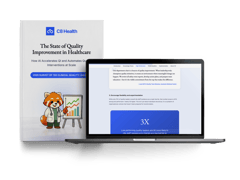
Reducing Healthcare Costs Through Knowledge Management Systems
The only way to consistently cut costs while improving patient outcomes is via evidence-based care. This approach ensures that every decision is informed based on the most recent evidence, preventing medical errors that can lead to significant cost savings while improving efficiency.
Yet, the real challenge is actually implementing these methods in your healthcare organization. Many healthcare facilities get stuck by thinking that the process only involves collecting, organizing, and sharing information. These steps are part of it, but there's still one missing piece.
You need to embed these evidence-based practices into day-to-day operations. This calls for a platform that doesn't just relay guidelines but actually helps providers adhere to them.
» Reduce healthcare costs with a knowledge management platform
3 Ways Knowledge Management Systems Reduce Costs
Knowledge management systems can play a vital role in reducing healthcare costs by helping organizations improve patient care, increase efficiency, and streamline processes.
Outcomes include reduced mortality rates, lower readmission rates, shorter hospital and ICU stays, and a decreased need for rehabilitative therapy.
1. Less Medical Errors
Knowledge management systems have the potential to significantly improve patient care by providing healthcare professionals with easy access to the latest medical research, evidence-based practices, and clinical guidelines.
This access to up-to-date knowledge empowers providers to make informed decisions, implement effective treatment plans, and deliver personalized care, leading to improved patient outcomes.
For instance, a knowledge management system might provide physicians with real-time access to clinical decision support tools, enabling them to make more accurate diagnoses, prescribe appropriate medications, and avoid unnecessary tests or procedures.
This, in turn, can reduce the risk of medical errors, complications, and adverse events, contributing to lower mortality rates.
Here's how Dr. Daniel Katz (Vice Chair of Education, Department of Anesthesia, Mount Sinai) improves patient care and reduces costs because he has access to actionable information in the OR:
2. Optimized Resource Use
Knowledge management systems help you efficiently organize healthcare resources by providing insights into specific use patterns, such as bed occupancy rates, equipment usage, and personnel deployment.
By analyzing these patterns, you can find areas of waste, such as unused equipment, overstaffed shifts, or long wait times. These insights enable data-driven decision-making to optimize resource allocation and improve operational efficiency.
For example, you can find peak demand periods and adjust staffing levels by analyzing bed occupancy rates and adjusting accordingly to avoid overcrowding and ensure timely patient care.
With knowledge management systems, healthcare organizations can achieve substantial financial benefits, such as reduced operating costs, improved revenue cycle management, and increased profitability.
» Check out 5 additional strategies to reduce healthcare costs.
3. Streamlined Administrative Processes
Knowledge management systems can significantly automate repetitive tasks, such as scheduling appointments, updating patient records, and generating reports. By streamlining these processes, healthcare professionals can simplify their workflows.
One of the key benefits of knowledge management systems is their ability to provide easy access to patient information.
Healthcare professionals can quickly and easily retrieve relevant patient data, including medical history, test results, and treatment plans, whenever and wherever they need it. This reduces the time spent searching for information and improves the quality of patient care.
Knowledge management systems can reduce the administrative burden on healthcare professionals, leading to reduced workloads and improved job satisfaction. When staff members are not bogged down by time-consuming tasks, they can focus more on providing high-quality patient care.
Automating repetitive tasks can also reduce administrative burden, contributing to lower labor costs. By automating, you can minimize the need for additional staff and optimize resource allocation.
Inefficient knowledge management can negatively impact patient outcomes and bog down workflows. Download our latest report to learn more
» Find out how cloud platforms are improving health administration
Choosing the Right Knowledge Managemen System for Healthcare
When looking for a knowledge management system, prioritize a solution that is specifically designed to address the unique needs of the industry.
A purpose-built platform, such as C8 Health, should offer the following:
- Local Content Validation: Ensure that the system can effectively manage and disseminate locally vetted information, aligning with the organization's specific guidelines and protocols.
- Multi-Platform Accessibility: Provide seamless access to knowledge on both desktop and mobile devices, enhancing user convenience and promoting widespread adoption.
- Interactive Content Formats: Incorporate dynamic and interactive content formats, such as videos, simulations, and case studies, to facilitate learning and engagement.
- Real-Time Notifications: Implement automatic notifications to keep healthcare professionals informed of any changes to policies, procedures, or evidence-based practices, ensuring timely updates.
- Data Analytics and Reporting: Offer robust data analytics capabilities to track the usage of the platform, measure the effectiveness of knowledge dissemination, and identify areas for improvement.
Prioritizing Knowledge Dissemination
To maximize the benefits of a KMS, it is essential to focus on effective knowledge dissemination. Consider the following strategies:
- Proactive Notifications: Utilize push notifications, email alerts, and other real-time communication channels to deliver relevant knowledge directly to healthcare professionals at the point of care. This can help to ensure that clinicians are always up-to-date on the newest practices and guidelines.
- User-Centric Design: Create intuitive and user-friendly interfaces that make it easy for healthcare professionals to search for, access, and apply relevant knowledge. Look for AI-powered search functions and mobile-optimized designs to enhance accessibility and usability.
» Discover how updated clinical guidance plays into your organization
Reduce Healthcare Expenses With Knowledge
Knowledge management systems can greatly help cut healthcare spending and make care better at the same time. These systems can spread awareness about evidence-based practices and encourage their use. This allows healthcare organizations to save a lot of money and, most importantly, help patients get better results.
As healthcare keeps changing, using knowledge management solutions designed specifically for this field is a smart move. It helps provide care that's both cost-effective and high-quality.
» Cut your costs with an AI-powered knowledge management platform
Disclaimer: Our content serves informational purposes only and shouldn't replace the advice and services of qualified professionals. While we strive for accuracy, we cannot guarantee an entirely error-free experience. C8 Health will not be liable for any losses or damages resulting from the use of our content.



